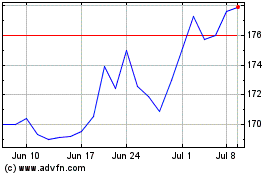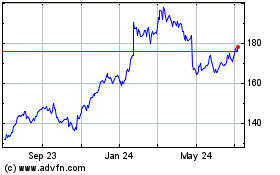Lenovo Group 3rd-Quarter Net Profit Rises 18.6%, Beating Forecasts -- 2nd Update
February 03 2016 - 6:14AM
Dow Jones News
By Eva Dou
BEIJING--To the chagrin of electronics makers, the world's
consumers appear to have decided that they have plenty of gadgets
already.
The world's largest personal-computer maker Lenovo Group Ltd. is
the latest company grappling with slack demand. It posted sales
declines in its PC and smartphone businesses for its fiscal third
quarter and warned Wednesday of "market challenges," despite
reporting a surprise net profit increase from cost cuts and growth
in sales of enterprise products.
For the past few years, electronics makers such as Lenovo have
offset a slowdown in PC sales by doubling down on smartphones. But
this strategy is reaping diminishing returns.
Worldwide smartphone shipment growth has eased from 80% in 2010
to 11% in 2015 and is expected to slow further, according to market
research firm Canalys. Global PC sales have slumped for several
years in a row, with vendors hoping for the bottom in 2016.
Consumers have yet to embrace new technologies like smartwatches
and virtual-reality headsets on a scale that can replace the
slowdown in PCs and smartphones.
"The golden years have passed," said Zhou Hao, an economist at
Commerzbank AG, of global electronics sales growth. "We maybe have
to wait for the next generation of products that can trigger new
consumption."
Even the strongest players haven't escaped the trend. Apple Inc.
forecast last month that its revenue in the current quarter would
decline for the first time in 13 years, as the world's appetite for
iPhones is finally sated. Samsung Electronics Co. posted a sharp
slowdown in profit from chips last week and warned that smartphone
competition would intensify.
Many smaller vendors have fared worse. Taiwanese smartphone
maker HTC Corp. reported Wednesday it swung to a net loss of 3.4
billion New Taiwan dollars ($101.4 million) in the fourth
quarter.
Lenovo Chairman Yang Yuanqing said in an interview Wednesday
that his company faced a "really challenging market," but aimed to
carve out top-line and profit growth this year by taking over
market share from PC rivals and redoubling smartphone efforts in
emerging markets.
"We think we can win through our efficiency," he said. "How we
can make money in this downturn period? Because we have the most
competitive cost structure."
Lenovo posted a surprise net profit gain Wednesday for the
quarter that ended Dec. 31 due to cost cuts, although its sales
fell. The company said its net profit for the quarter rose 18.6%
from a year earlier to $300 million, beating the $226.3 million
average estimate of 19 analysts surveyed by Thomson One Analytics.
Revenue fell 8.5% to $12.9 billion from $14.1 billion a year
earlier.
Depreciating currencies in emerging markets have hit gadget
makers, which generally pay their suppliers in U.S. dollars and
ring up sales in local currencies. Lenovo said its revenue decline
in the quarter would have only been 2%, not 8%, without currency
depreciation. Chief Financial Officer Wong Wai Ming said on an
investor call that Lenovo would consider raising product prices in
emerging markets if depreciation continues.
Lenovo reported its Motorola handset business broke even for the
first time in the past quarter, meeting its forecast of turning the
business profitable within a year and a half of acquiring it from
Google Inc. It helped that Lenovo had taken a massive write-down on
smartphone inventory clearing and restructuring in its fiscal
second quarter, which had dragged it into its first quarterly loss
in more than six years.
A bright spot for Lenovo was its enterprise business, which
includes servers and networking products. The group's revenue rose
8% in the quarter, while its business groups catering more to
regular consumers--PCs and smartphones--saw sales fall.
With the addition of the Motorola business, Lenovo was the
world's fourth-largest smartphone maker by shipments in the fourth
quarter with 5.1% of the global market, according to market
research firm IDC. It trailed Samsung, Apple and Huawei
Technologies Co.
Canalys analyst Nicole Peng said much of Lenovo's headway in
smartphone sales in recent months has been due to competitively
priced devices in emerging markets like India, as the company has
lost share in China to rivals like Huawei. Lenovo's smartphone
shipments in India rose 75% last year, while they fell 53% in
China, she said.
Write to Eva Dou at eva.dou@wsj.com
(END) Dow Jones Newswires
February 03, 2016 05:59 ET (10:59 GMT)
Copyright (c) 2016 Dow Jones & Company, Inc.
International Business M... (NYSE:IBM)
Historical Stock Chart
From Mar 2024 to Apr 2024

International Business M... (NYSE:IBM)
Historical Stock Chart
From Apr 2023 to Apr 2024
